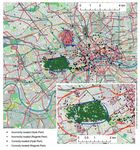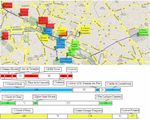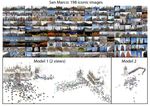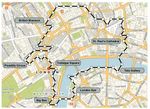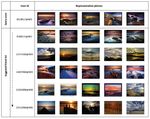An overview of Flickr challenges and research opportunities
←
→
Page content transcription
If your browser does not render page correctly, please read the page content below
An overview of Flickr challenges
and research opportunities
Evaggelos Spyrou Phivos Mylonas
Computational Intelligence Department of Informatics
Laboratory Ionian University
Institute of Informatics and
Telecommunications
National Center for Scientific
Research DemokritosIntroduction • An extremely large amount of digital multimedia content is shared online every moment within the social networks • This online social networking explosion shows no signs of abating, with almost twice as many internet users having an online social profile than two years ago • According to recent research, Facebook is the most viewed website in the European Union • On top of that, more people are using the Internet to create their own multimedia content than ever before, with 73% of online users having a social networking profile compared with 37% in 2008
• Flickr was created in 2004 by Ludicorp • Currently owned by Yahoo! • It is an online community; users are able – to interact by sharing comments about photography – to create groups of particular interests • ~92M members, 1M uploads/day (Feb. 2014) • >14 billion photos!!! (July 2014)
Sharing and Tagging Photos • Tagging: adding descriptive keywords to photos • Keywords differ between “consumers” and “producers” of digital content • Users employ Flickr as a means of keeping a personal archive and also sharing photos with friends and family • Reasons for tagging lie in the social organization and communication possibilities that Flickr offers • Flickr is treated more as a virtual community, less for commercial gains • Flickr users often interact (comments/questions) • More possible to annotate when users are given motivations/affordances
Research Opportunities on Flickr
• Flickr has been very popular due to:
– Largest collection of community geo-tagged photos
– Offering a public API for accessing photos+metadata
• Research efforts focus on:
– The use of textual metadata
– The visual aspects of multimedia content analysis (visual low-level features)
– Combination of visual and textual metadata
• When using tags, special attention has been given to:
– Tag recommendation (automatic generation of tags)
– Prediction of geo-tags (localization)
• We surveyed these works in:
E. Spyrou and Ph. Mylonas
“A Survey of Geo-tagged Multimedia Content Analysis within Flickr”
Proc. of 3rd Mining Humanistic Data Workshop (MHDW), 2014Research Opportunities on Flickr
• We now conclude our review with:
1. Travel Applications
• Visual Reconstruction: using a set of photos to construct a 3D
model of a landmark
• Recommendation Systems: automatic discovery of main
attractions
• Trip/Route Suggestion Systems: recommendation and efficient
schedule organization
2. Extraction of Knowledge from Flickr metadata
• Organization of content into hierarchies / ontologies /
folksonomies
3. Human Activity Tracking
• Study the relationships among users/user activities/behaviors
4. Everything elseFlickr and Travel Applications • Visual Reconstruction – Agarwal et al. (2011): Built Rome in a day – Snavely et al. (2006): Found paths of and created 3d models
Flickr and Travel Applications • Visual Reconstruction – Li et al. (2008): 3d models using iconic graphs – Kaminsky et al. (2009): Alignment of 3d point clouds to overhead images
Flickr and Travel Applications
• Recommendation Systems:
– Van Canneyt et al. (2011): • Chen and Roy (2009): Event
Recommendation of popular Detection
placesFlickr and Travel Applications
• Recommendation Systems:
– Hollenstein and Purves: – Yao et al. (2013): Flickr Friend
(2013) Used flickr tags to Recommendation
describe city coresFlickr and Travel Applications
• Trip/Route Suggestion Systems:
– Jain et al. (2014): Mining – Popescu et al. (2009): Mining
Distance-Constrained Trips tourist informationFlickr and Travel Applications
• Trip/Route Suggestion Systems:
– Hao et al. (2009): experience – Sun et al. (2013): Road-based
virtual tours by presenting travel recommendation using
information mined from user- geo-tagged images
generated travelogues and
photosExtracting Knowledge from Flickr Metadata • Schmitz et al (2006): Induces an ontology using Flickr tags • Firan et al (2010): Classifies event photos using an ontology • Lu and Li (2010): Exploit semantic hierarchies to organize Flickr groups • Negoescu et al. (2009): grouped Flickr groups using a cluster approach, in order to create “hypergroups”, easier to find • Prangprasopchok and Lerman (2008): constructed Flickr based folksonomies • Xie et al. (2014): proposed an algorithm of an augmented folksonomy graph (AFG) • Lee et al. (2014): detected point-of-interest patterns
Human Activity Tracking • Negoescu and Perez (2010): tried to model users and groups with a common tag-based representation • Cha et al. (2009): showed that photos spread due to social links • Valafar et al. (2009): studied user interactions by analyzing their temporal properties • Mislove et al. (2008): used empirical data and investigated the link formation process; users with many links create more links • Lerman and Jones (2006): showed that the primary way that users follow when they aim to discover photos is not by tag-based search or subscription to specialized groups, but browsing through photo streams of their contacts
Other Flickr Application Domains • Jin et. al. (2010): Used Flickr for social studies
Other Flickr Application Domains • Yanai et al. (2009): Detected cultural differences from geo-tagged Flickr photos
Other Flickr Application Domains • Yanai et al. (2009): Extracted Relationships between concepts and places
Other Flickr Application Domains • Zhang et al: Discover and Visualize Tag Relationships from Geo-spatial and Temporal Similarities
Conclusions • We presented research works that use flickr… • … and focus on 1. Travel Applications 2. Extraction of Knowledge from Flickr metadata 3. Human Activity Tracking • Flickr has boosted research on many areas by providing a user generated large dataset… • …and a public API • Our intention was to identify the trends in the surveyed area and organize them • We plan to extend this survey on several other social networks
Thank you!
You can also read



